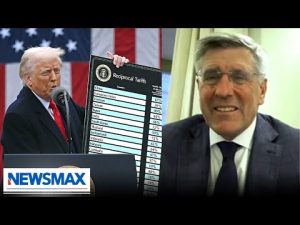Prime Minister Benjamin Netanyahu’s recent visit to the United States goes beyond a typical diplomatic engagement; it presents a critical opportunity for both nations regarding tariffs and trade policies. While the focus remains on the ever-volatile situation in Gaza and Iran, the implications of Israel’s trade offer to eliminate tariffs completely with the U.S. are noteworthy. For context, Israel currently maintains zero tariffs on 98% of products imported from the United States due to a longstanding free trade agreement. Yet, the situation has become muddled thanks to recent miscommunications—one notably bizarre chart from the Trump administration wrongly suggested that Israel applies a staggering 33% tariff on U.S. goods. That’s more fictional than a Hollywood blockbuster.
This misinformation surrounding tariff rates has added unnecessary confusion to trade negotiations. In reality, the Trump administration has an enticing offer on the table: the possibility to eliminate all tariffs with Israel, which could serve as a model for other countries, including Vietnam. Similar to Israel, Vietnam has a free trade agreement with the United States that keeps tariffs low, despite incorrect reports suggesting otherwise. For instance, the effective tariff rate on American goods in Vietnam, including a value-added tax, hovers around 19.4% for agricultural products. Yet, if both nations are willing to negotiate lower tariffs—potentially even to zero—it would signal a robust commitment to free trade.
Engaging with these countries to eliminate tariffs isn’t just a good idea; it’s essential for a thriving economy. President Trump’s rhetoric on tariffs could paint a grim picture for many Americans. Statements suggesting prolonged tariffs seem to insinuate economic turmoil, reminiscent of a storm cloud looming over the market. The jitters in the stock market experienced after his “hang tough” comments exemplify this anxiety. Investors don’t like uncertainty, and prolonged tariffs will result in painful consequences. This is not just doom and gloom; it’s about wanting a stable financial future for Americans who strive for growth and prosperity.
To leverage real change, Trump must consistently advocate for free trade, not just within Israel and Vietnam but across the globe. This requires him to adopt a mindset that scraps the notion that tariffs are a cure-all for America’s trade ills. Instead of envisioning tariffs as a shield, they should be viewed as a bargaining chip to encourage other nations to open their doors. If President Trump can articulate this vision effectively, he could transform current trade challenges into opportunities for a fruitful economic landscape.
However, the mixed messaging from the administration risks losing sight of this strategic vision. Some advisors appear to be echoing “4D chess” theories to rationalize tripping over their own feet in trade negotiations, while others don’t seem to have a coherent plan in sight at all. Unless the administration can converge on a clear, unified message advocating for zero tariffs, it may struggle to maintain the confidence of both the markets and the American people.
In an era marked by economic uncertainty, conservative policymakers must prioritize clarity, transparency, and coherence in their trade policies. With Netanyahu willing to negotiate and Vietnam eager to play ball, this is a perfect moment to put ideology aside and embrace the practicality of expanding free trade. By seeking to eliminate tariffs collaboratively, the United States can create pathways for economic growth domestically and abroad—a victory that is both politically and morally sound. So, here’s hoping that amidst all the quagmire, the light of free trade shines brighter than ever.







